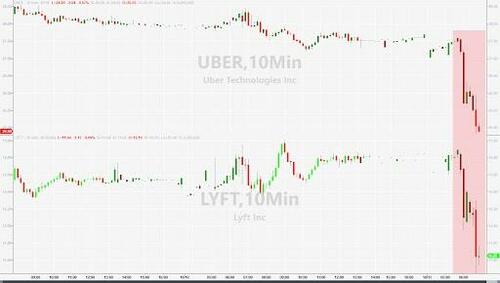Uber & Lyft Crater On Biden Proposal That Could Lead To Employee Status For Millions Of Gig Workers
Shares of Uber and Lyft tumbled on Tuesday, falling by double digits and adding to the market’s gloom, after the US Department of Labor announced a proposed rule change that would change the way that it determines if workers can be classified as employees or independent contractors.
The Department of Labor said in a statement that it believes the new proposal will “help protect workers from misclassification” – translation: as the NYT explains, the proposal could lead to employee status for gig workers. Some more details:
The Labor Department on Tuesday unveiled a proposal that would make it more likely for millions of janitors, home-care and construction workers and gig drivers to be classified as employees rather than independent contractors.
Companies are required to provide certain benefits and protections to employees but not to contractors, such as paying a minimum wage, overtime, a portion of a worker’s Social Security taxes and contributions to unemployment insurance.
The proposed rule is essentially a test that the Labor Department will apply to determine whether workers are contractors or employees for companies. The test considers factors such as how much control workers have over how they do their jobs and how much opportunity they have to increase their earnings by doing things like offering new services. Workers who have little of either are often considered employees.
The new version of the test lowers the bar for that employee classification from the current test, which the Trump’s administration’s Labor Department created.
The proposal is intended as a so-called interpretive rule that doesn’t have the legal force of a regulation specifically authorized by Congress, and it applies only to laws that the department enforces, such as the federal minimum wage. States and other federal agencies, like the Internal Revenue Service, set their own criteria for employment status, and the rule would not directly affect what they decided about the status of gig workers.
But many employers and regulators in other jurisdictions are likely to consider the department’s interpretation when making decisions about worker classification, and many judges are likely to use it as a guide.
In response, Uber stock as much as 9.9% in early trading, while Lyft sank as much as 11%…
… sending LYFT stock price to a fresh record low as Uber outperforms due to its somewhat more diversified business model.
The full proposal is below.
Tyler Durden
Tue, 10/11/2022 – 09:52

